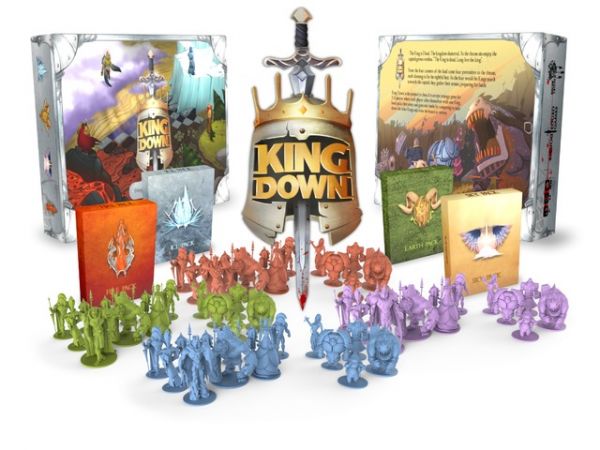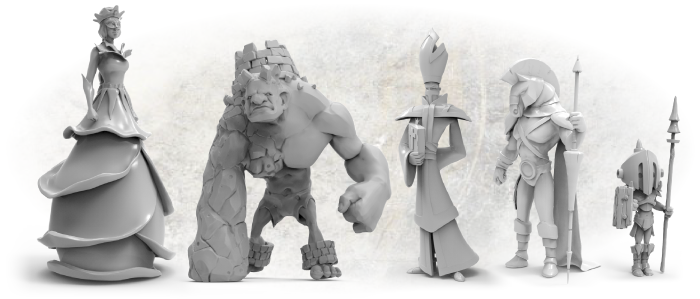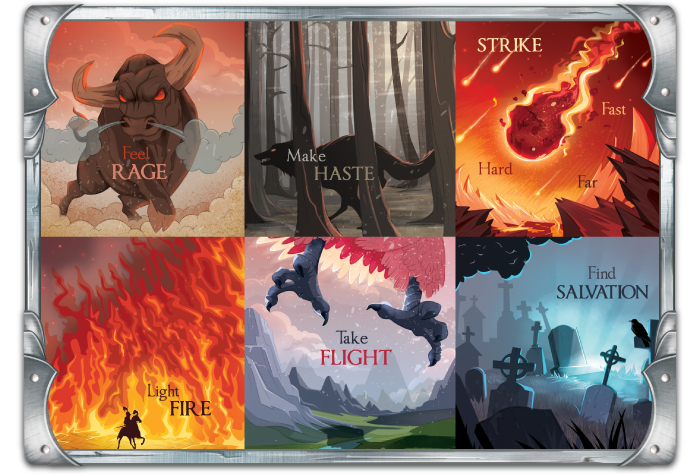Modern-day Chess: A Preview of King Down

What would Chess be like if it were invented in the 21st century? Would it have great artwork, detailed sculpts, and specialized decks of cards? What about support for more than 2 players or a slight element of chance? King Down is a new game on Kickstarter that is bringing the traditional game of Chess into a modern gaming era. Let's take a closer look.
Gameplay
King Down is the latest creation from Saar Shai, designer and publisher of The Agents, which is famous for its clever "double-edged" card mechanic. King Down uses a 64-square board, similar to Chess, but with distinctive artwork and some special areas of the board. The center 4 squares are called the Capitol — pieces that reach this area earn victory points, as well as additional cards in a player's hand. The 6 center squares on each edge are the player's Frontline — pieces are "summoned" into this area initially, and are immune from attack here.
The object of the game is to be the first to accumulate a total of 8 victory points. A player earns a victory point for each piece he captures from an opponent, as well as for each piece currently in the Capitol. Kings are worth an additional point in each case. Victory points are not permanent, but can and will fluctuate throughout the game depending on the location of the pieces. For instance, a piece that leaves the Capitol will decrease the player's total victory points, and even a piece that is captured can be saved and returned back to the owner, if the right cards are played.

Each player begins the game with a certain number of pieces that correspond in movement with standard Chess rules (e.g., Pikes move and capture like pawns, Steeds move and capture like knights, etc.). These pieces are placed off of the board into the player's Camp. Each player is also assigned a deck of cards, which he places face down on the table. Several cards are drawn at the beginning of the game.
On a turn, a player can choose a total of 4 actions from the following:
- Call (4 actions) — summon a piece from your Camp to your Frontline.
- Take (3 actions) — using standard Chess movement rules, move one of your pieces onto a square occupied by an opponent and capture his piece.
- Move (2 actions) — using standard Chess movement rules, move one of your pieces on the board.
- Draw (1 action) — draw a card from your deck and add it to your hand.
- Play a card (1-2 actions) — place a card face up on the table. The number of actions required is shown on the card.
There are 2 types of cards: Calling cards (no, these don't include long distance phone credit) and Spell cards. Calling cards depict one of your pieces and allow you to summon that piece to your frontline for fewer actions than usual or gain an extra movement for that piece. Spell cards are placed on top of a specific Calling card and grant a special ability to that piece. There is a limit of 3 total cards for any player's hand or played cards, plus 1 for any pieces currently in the Capitol. A player can discard any cards he wishes at the end of his turn and draw new cards in their place.
To win, a player must strategize which actions and cards to use to help him reach a total of 8 victory points before anyone else.

Review
There are a lot of Chess clones in existence, from card variants to re-themes. Putting a twist on the classic game of Chess is nothing new — however, what is new is that King Down feels fresh, adds amazing artwork and great-looking sculpts, and is the first I have seen that brings this classic game into the modern gaming era with full force. If Chess were invented from scratch to be a winner in today's gaming scene, the result would be King Down.
From a casual gamer's perspective, the game is relatively easy to learn. This is thanks to the fact that almost everyone is familiar with the basic moves of Chess. Take that knowledge, add some details about card play and actions, and you're ready to play. However, once you get going, you realize that this is a completely new game. The end goal is different, the strategies are different, there is support for up to 4 players, and hidden information and a slight element of chance have been added to spice things up. Step aside, chess masters — there is no need to study world-class Chess moves to have a shot at this game.
In addition, there are fewer pieces to decide from, reducing the complexity and available moves, which is a plus. However, this is not to say that there are no decisions to be made — on the contrary, there are many actions available to choose from, as well as different cards that greatly enhance gameplay. There are many different strategies available, and it will take several plays to really get a good feel for the game. It feels like a medium-weight strategy game, which is great for Chess veterans and casual to serious gamers, but may not be ideal for beginning players who prefer party games or games with a higher ratio of luck to strategy.
On the downside, we had a few questions about the rules that were not addressed in the rulebook, and we also felt that player reference cards would have been a welcome addition to summarize the available actions. The edition we played is an early prototype, however, and it is clear that the final version will be greatly enhanced and polished.

Final Thoughts
If you're looking for a solid Chess variant, look no further. King Down is unique, fun, and highly dynamic, yet it borrows enough from the original game to feel familiar to most players. Plus, the campaign video is absolutely epic — if the quality of the presentation is any indication of quality of the final game, we're all in for a treat.
Be sure to check out King Down on Kickstarter from now until October 12, 2014.
Pros: Familiar gameplay with fresh and modern design, great artwork, relatively easy to teach
Cons: Final version could use some rule clarifications and reference cards, may be a bit heavy on strategy for beginning players
Disclosure: this preview is based on our evaluation of an unpublished prototype of the game, which is subject to change prior to publication. While a modest payment was received to expedite the review process, our thoughts and opinions expressed here are honest and accurate.




